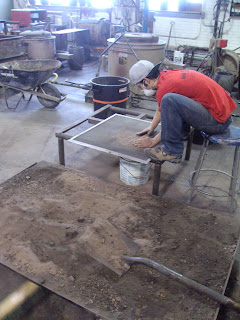This junior level course will examines environmental sculpture using progressive and ancient metal casting processes. The goal is to develop conceptual responses to the act of casting bronze, copper, iron, aluminum and steel whilst engaging with experimental mold making and furnace building techniques, exploring new and emerging technologies and utilizing alternative and locally available materials along with sustainable energy and fuels.
By enrolling on this course students participating in a human tradition, which is at least 5000 years old. The task is to learn from and expand this tradition. Environmental Foundry is designed to present the student with a number of metal casting experiences, which will hopefully expand both a personal vision and increase technical and aesthetic skills.
The objective is to provide basic technical and conceptual experiences that are concerned with the process, art and act of casting.
The methodology of the course is based on problem solving and sculpture building assignments. With hands on demonstrations, slide and video presentations throughout the semester we will also discuss and examine the historical precedents and contemporary issues relevant to the practice and process of environmental and cast metal sculpture.
















